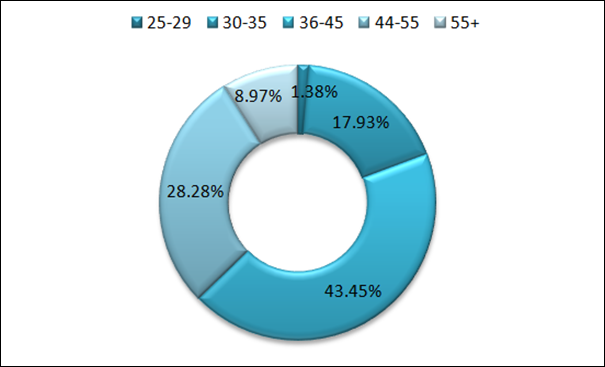Lifting the Veil of Doubled Payment Offers
By Robert Parkinson, CEO & Founder of RMG

When it comes to the time of Chinese New Year, salary is always a hotly debated topic in the job market. People like talking about family and neighborhood issues at holiday parties and gatherings. Besides, it is quite frequent that peers talk about their work and staff treatment issues. For many years there has been much debate on what really drives people to change jobs. Various answers including salary, promotion, line manager style and organizational culture actually make people quite confused. I think that ALL those factors surely matter in job changing decisions.
According to RMG’s China Talent Flow Survey 2013 (TFS2), salary is the first factor that drives people to change jobs. It accounts for 69% among the all factors in our report. Post Chinese New Year is the peak period of job-changing. Quite a lot of people are actively looking for new opportunities with higher salary than their current companies. However, do you really think changing jobs for higher a salary is as wonderful in reality? As an old Chinese idiom says, there is no weal without woe. Making wrong choices because of being blinded by money is nothing worth celebrating in the year of the horse!
Before I start to share my experiences, I’d like to ask you a question about the definition of the word “occupation”. I have always wondered why nearly two-thirds of participants regard salary as the most important factor. As I check out the word on Wikipedia, I finally understand that people’s choice is closely related to the definition of “occupation”. According to Wikipedia, occupation is defined as a regular activity where people spend time to earn money. In this case, it’s quite obvious why people change jobs for money. From a psychological perspective, according to Maslow’s hierarchy of needs, in the beginning of one’s career they aim to earn enough to support basic needs. Moving on to the next stage, people work to get higher and higher payment to satisfy their wants. Finally people will enter the stage of self-actualization where they do not care about salary anymore. Most Chinese people start working from 18 to 24 years old. They will not stop until they are about 55 years old. Normally, people in the beginning and middle parts of the work life span tend to change jobs for higher and higher salary. However, not everyone can enjoy the process of changing jobs. If you happen to get an offer with a doubled salary, don’t be eaten up by your excitement right now. Today the job market has become mature and transparent. If you don’t know why you got such an offer, then you’d better reconsider it. Now let me share some career cases about changing jobs and salary with you.
Have you calculated your working time?
Let’s say that right now you are a manager whose annual salary is about CNY 100,000. There are 3 offer letters in front of you, CNY 150,000, CNY 200,000 and CNY 300,000 respectively. How would you make a choice? If you would like to take the first offer, then I would congratulate you for your sensibility; if you chose the second offer, I suppose you would be willing to take some new challenges in your career. However, if you decided to go for the highest one, I would be quite worried that you might oversee the cost of working time. In particular, for those who are used to leaving the office when the clock hand strikes the number 6, you might quite enjoy the regular working times and 15 days annual leave with your current company.
Can you convince yourself that for a tripled salary, you can still enjoy your work? According to RMG’s senior IT consultant, a lot of IT companies do not pay for overtime workers, they are paid by projects. Data from RMG’s China Talent Flow Survey 2013 (TFS2) show nearly 40 percent of IT support and technical talent changed jobs in the past 12 months. In IT people change jobs quite often because they are looking for bigger or better projects to get more experience.
Do you have a strong enough supporting team?
You will probably miss the big picture if you only focus on the money. What I mean by big picture is actually the work going on around you. For instance, the support from a company’s finance, recruiting and operations teams directly influence whether you can do your work successfully and efficiently. Say at the current company your KPI is quite good. It might not be 100% related to your work. Without the support from other teams, can you still achieve your KPI score?
In fact, there is always a good support network behind a successful manager. Imagine you go to the new company for a higher salary but end up with a less effective supporting team. Neither you nor the company will be happy. Worst of all, you will end up with an unpleasant resignation session. The logistics team leader in our company says that lots of sales managers in small logistical companies look forward to working on an international platform. They all want to show their excellent skills on a good platform where they can boom the business.

Are you ready for a different corporate culture?
Some managers will start looking for better career opportunities after working in a company for 3 to 5 years. The reason might be that they are looking for a new environment or there is a lack of promotional space. These kinds of managers will pay more attention t o s a l a r y and development opportunities. According to TFS2, in the past 12 months, the job-changing proportion of participants whose monthly salary is above CNY 50,000 is 37.24%. In comparison to others, the job changing rate for this group is the highest. Moreover, another interesting finding related to the highly-paid group is that 76.55% of those participants are above 36 years old. (See Chart 1 and Chart 2).

Frankly speaking I understand that people like measuring their values at work based on salary. However, it is necessary for everyone to know that salary is not the only way to measure one’s value. In a lot of western countries people will have a New Year’s resolution. I am sure many Chinese will do something similar. Everyone will make a wish list for their work and life in 2014. Nobody looks forward to endless overtime, inefficiency from subordinates, or little attention being paid to new ideas. Changing jobs for a higher salary seems quite wonderful, but after lifting the mysterious veil, will you reap what you sow?



